Contents
From a botanical point of view, there is no difference between swede and turnip as such. Both vegetables belong not only to the same family, but also to the same genus. However, from the point of view of the average consumer, there is a difference between these two vegetables, and it is not only in the culinary differences.
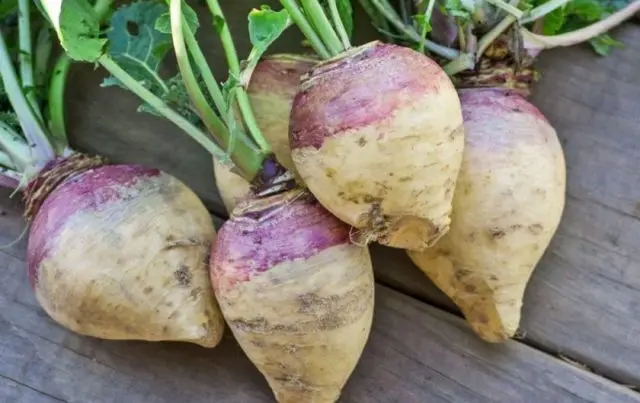
What is the difference between rutabagas and turnips
The difference between turnip and rutabaga, of course, is. Moreover, in some issues they are pronounced. For example, despite the same growing conditions, the agrotechnics of plants may differ due to the timing of their maturation. The taste qualities of plants, as well as their nutritional value and calorie content, are slightly different. The following are the features of these vegetables and their differences from each other.
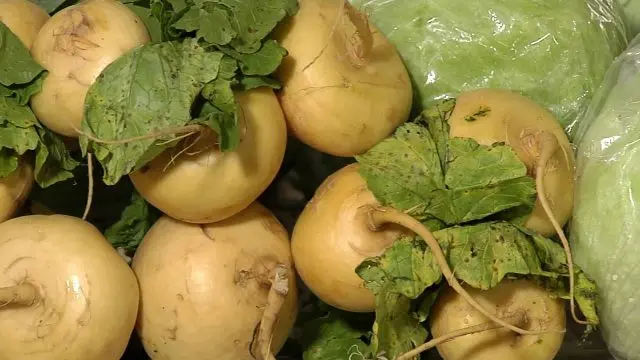
Origin
The exact history of the appearance of swede is unknown. There is an assumption that it was received relatively recently, no more than 500 years ago, in the south of Europe. Artificial or natural, a plant appeared, which is the result of an accidental crossing of turnips and one of the varieties of local cabbage. However, since the vegetable is most popular in the northern regions, this assumption is most likely incorrect.
According to another version, swede was first obtained in Eastern Siberia at the beginning of the 17th century, from where it first came to the countries of Scandinavia, and then gradually spread throughout Europe.
With turnips, everything is much simpler: it was known to mankind as early as 2000 BC. Appearing for the first time in the western part of Asia and the Middle East, the culture quickly spread almost everywhere.
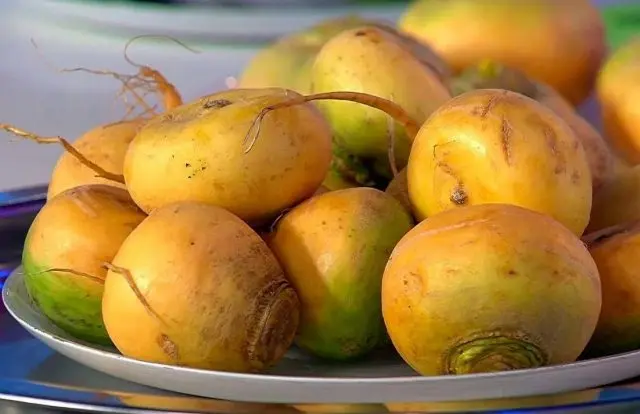
Distribution
The crops currently have an almost completely identical range, since their growing conditions are the same. For normal ripening, the plant needs low temperatures (from + 6 °С to + 8 °С). Too long stay of vegetables at temperatures above + 20 ° C (especially at the final stages of ripening) adversely affects the quality and taste of fruits.
That is why, on an industrial scale, plants are grown mainly in the northern regions and in regions with a temperate or sharply continental climate. In regions with warm or hot climates, only a few adapted turnip species can be found.
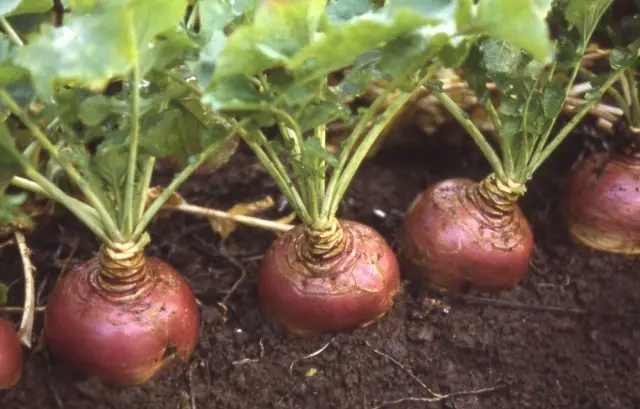
Appearance
The appearance of the aerial part of both plants is very similar: the same yellow four-petalled flowers, collected in raceme-type inflorescences, very similar leaves, pods and seeds. The main differences are in the appearance of the roots.
Traditionally, turnip has a flattened shape of the root crop, the root crop of swede is more often pointed. Rutabaga roots have a slightly thicker skin than turnips. The color of the skin is also different: the turnip usually has a light uniform yellow or whitish-yellow color, the turnip root is gray, purple or red in the upper part, and yellow in the lower part.
Also, the difference lies in the appearance of the pulp: here the swede is a little more diverse, its flesh can be almost any shade, while the turnip is most often white or yellow.
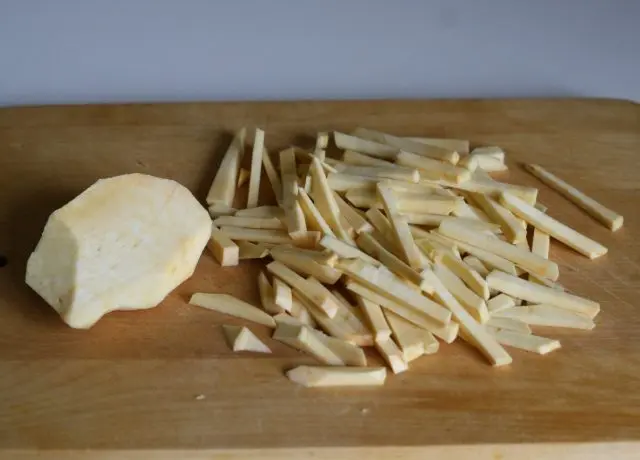
Composition
According to the vitamin and mineral composition, plants have the following differences:
- swede contains about a quarter more vitamin C (up to 25 mg per 100 g);
- it contains more fats (saturated acids – almost 2 times, monounsaturated – 3 times, polyunsaturated – 1,5 times more);
- it has a greater amount of minerals (potassium, calcium, sulfur, magnesium and iron).
The rest of the composition of vegetables is approximately the same.
Using
Both vegetables are used both raw and processed. They go to various salads, first and second courses. Can be used stewed, boiled and fried. Traditionally, turnips were cooked in their own juices, and rutabagas were combined with other types of vegetables in various dishes, such as stews. However, at present, both vegetables can be used in a wide variety of forms and methods of preparation.
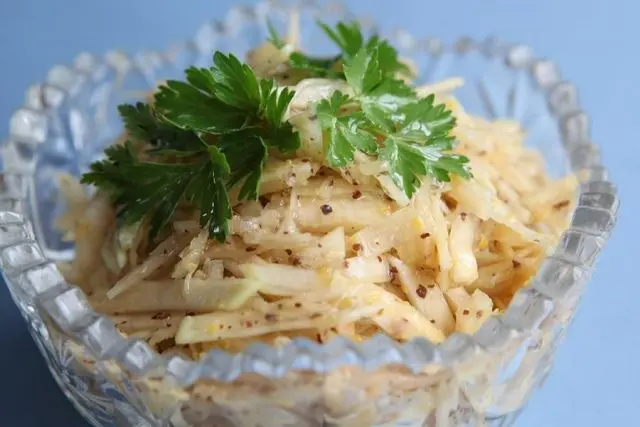
Taste differences between rutabagas and turnips are subjective. Rutabaga is considered less tasty, although it is actually more beneficial for the body as a whole.
Both cultures also have uses in traditional medicine. They have similar not only methods of application or lists of diseases, but even contraindications.
Features of growing rutabagas and turnips
Growing turnip and swede is very similar. In fact, the process of planting and caring for plants is completely identical, with the exception of two points: the timing of ripening and the timing and methods of planting vegetables arising from them.
Turnip (depending on the variety) has a ripening period of 60 to 105 days. For rutabaga, this time is much longer. The most early ripening varieties ripen by 90-95 days, while for most varieties these terms are 110-130 days.
In practice, this leads to the fact that turnips are often grown in two sowings: in early spring (April, rarely May) or in early July. At the same time, the crop of the first sowing is harvested and used already in the summer, and the result of the second sowing is harvested almost at the end of autumn for winter storage in cellars and vegetable stores.
With rutabaga, such a method of growing will not work, because the “first wave” of the vegetable simply does not have time to ripen. And it’s not just about timing. A relatively low temperature (+ 6-8 °С) is required for normal ripening of swede and turnip. And if the “summer” turnips of the first wave can somehow still be eaten, then no one will certainly like the taste of unripe swede.
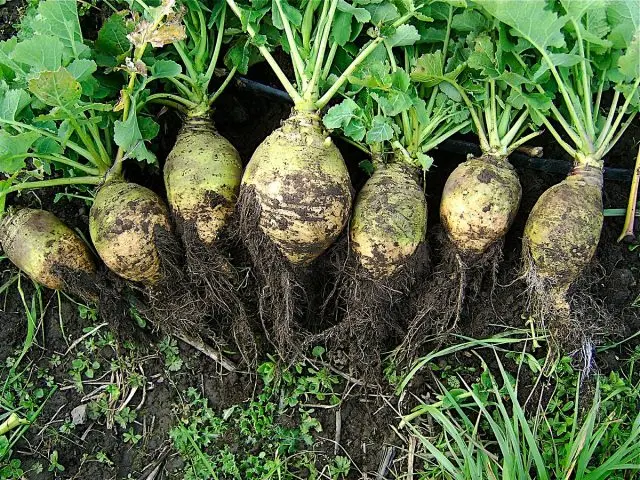
In addition, to further improve the taste of turnips harvested for the winter, they are harvested about 2-3 weeks later than swede. And the reason for this also has a gastronomic character: the ripening of swede in September-October improves its taste to a lesser extent than a similar process in turnips.
Therefore, it is recommended to harvest rutabagas in mid-late September, and harvest turnips in the 2nd-3rd decade of October. This means that turnips will be planted in June-July, and turnips in April-May. Moreover, if in April there is no guarantee of the absence of frosts dangerous for rutabaga, it is better to use the seedling method of growing.
For turnips, as a rule, the seedling method is never used.
Which is better to choose
This question cannot be answered unequivocally, since the taste preferences of each person are individual. It is believed that swede is more useful, but less tasty. But this is not a particular problem, since each of the vegetables can be prepared either by preserving or changing its taste. In addition, often both products are not used independently, but are part of more complex dishes.
From the point of view of usefulness, turnips will be more preferable in the fight against colds, and swede – in the normalization of metabolism. If we talk about the impact on the digestive system, then the difference in both vegetables will be small.
Conclusion
The difference between swede and turnip, although invisible at first glance, is still present. Despite the close relationship of plants, they are still different species. Plants have differences in the appearance of root crops, their vitamin and mineral composition, even their agricultural practices are slightly different. All these differences, of course, affect the taste of vegetables and their areas of application.









